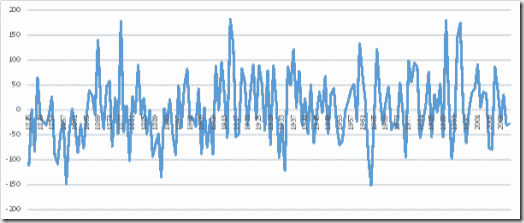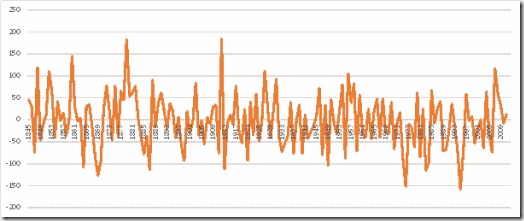The reason I ask that is because of this BBC news item about the recent bad weather.
You see, this winter has been really mild, which is in stark contrast to the last two or three, which have been very cold with a lot of snow. Until a couple of years ago, you had to go back to the 1980s to find a winter where snow even settled, let alone hung around for more than a few days, and before that it was the early 1970s. Then there were the summers. A few years ago we had one of the wettest on record, with huge downpours, thunderstorms, and localised flooding. Not long before that we had some very warm summers, but that didn’t stop the “scientists” telling us that that was the end of the sun for the next generation or so as recently as last spring, which started later than usual.
That’s right. We mustn’t forget that only last June the Met Office was telling us that there’d be no summers for at least a decade. Within a few weeks temperatures had soared, and in the end the Met Office statistics showed it to be the “warmest, driest, and sunniest summer since 2006”. In fact, the statistics don’t do it justice, because the warm weather ran all the way from June until at least September. I don’t think I actually slept under blankets for that entire period. Even now – in early 2014 – we’re effectively still experiencing the same heat wave – just turned down a few notches for the winter months.
The Met Office has a history of making highly inaccurate predictions. There was the legendary 1987 forecast, where Michael Fish said there wasn’t a hurricane on the way, but which saw the worst storm for 300 years pounding the South East, with record damage and 19 dead. The Met Office completely failed to predict the severity of that storm. Then there was the infamous “barbecue summer” forecast in 2009, where summer actually turned out to be one of the wettest on record. It was the third summer in succession where the Met Office had got it absolutely wrong, and as a result it no longer issues long range forecasts. And back then, they were blaming the El Nino Effect. No one predicted the late spring last year, nor did they predict the prolonged heat wave or the wet weather experienced so far this year. And don’t forget that as recently as April 2012 we were in a drought which was forecast to “last until Christmas” (it began in 2010).
So it came as a bit of a surprise that the Met Office has someone it refers to as a “chief scientist”, and who – in the face of the examples I gave above – can come out with nonsense like this:
Dame Julia Slingo [the alleged “chief scientist”] said the variable UK climate meant there was “no definitive answer” to what caused the storms.
“But all the evidence suggests there is a link to climate change,” she added.
“There is no evidence to counter the basic premise that a warmer world will lead to more intense daily and hourly rain events.”
It’s rubbish! Scientists cannot agree on what’s going on, and when you strip away the hype you’re just left with some weather. And by hype, I mean idiotic numbers like this:
More than 130 severe flood warnings – indicating a threat to life – have been issued since December. In contrast, there were only nine in the whole of 2012.
That is unscientific and meaningless. And in the story, Slingo says that the UK has seen the “most exceptional period of rainfall in 248 years”. Another useless statistic when you consider that the 1987 storm was the “worst for 300 years”.
In fact, it is quite easy to get hold of the raw data concerning rainfall since 1845 for the UK. And if you plot it on a graph, this is what you get. First of all, the winter rainfall expressed as a percentage of the mean for the entire period:

And this one is the summer rainfall expressed in the same way:
For the winter graph, the trend is virtually flat since 1909 (winters appear to have been very slightly drier on average before that). It’s only when you go back as far as 1865 that you can say the average rainfall for winter has increased. For the summer graph, the trend is slightly downwards all the way through (i.e. summers tend to be a bit drier now than they were at the turn of the 20th century).
To listen to Slingo and most other meteorologists, you’d be forgiven for thinking that there was a sharp upward trend. In fact, there is absolutely nothing of the sort. For every peak, there is an earlier and a later trough – but if you just focus on the last peak at any point in time you could fool yourself into arguing that the trend is upwards. I suspect this is what Slingo and other pseudo-scientists are very adept at doing, and they have the media to propagate their myths.
Another thing is that when you look at data by region, in any given year you might find one area (e.g. Wales) which has much more than the average rainfall, and yet in another area (e.g. Scotland or England) the rainfall is at or below the average. And if you go into even finer detail, and look at individual weather stations, you might find that over any given period one station has recorded a monsoon, whereas one a few tens of miles away has only picked up a fraction of the rainfall. Indeed, this dramatic variation occurs on all scales – town to town, country to country, and continent to continent.
No one is denying that the people in Somerset have got it rough at the moment (though they’d better prepare to slip into the background again, now that the Thames is flooding). But all you have to do is look at historical floods in the UK and you see that in spite of the rhetoric (“the worst in living memory”), there are various examples from the last century or so involving British cities and towns (and those are just the dramatic ones).
All of this convinces me that meteorology isn’t a science, since those who claim to be meteorologists certainly don’t seem to behave scientifically.